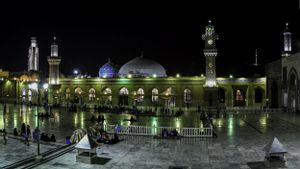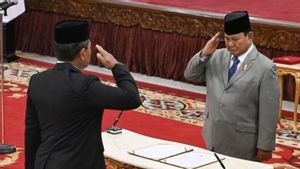JAKARTA - The month of Ramadan is a month full of grace and forgiveness. Each phase has its own priority charge. In the first 10-day phase, the priority is full of grace. While the priority of the second 10 days of Ramadan is full of forgiveness.
There are two guidelines or instructions for pursuing priorities during Ramadan. First revealed in the history of Al-Baihaqi, contains the following:
"The beginning of Ramadan is a blessing, the middle is forgiveness, while the end is freedom from hell."
As reported from Kompas, Saturday, April 24, the quality of the above narration needs to be strengthened even though the above hadith can encourage a person to improve his deeds so that his sins are forgiven.
Why are the second 10 days of Ramadan full of forgiveness? Here is an excerpt of a hadith that shows the specific time of the virtues of the second 10 days.
"Whoever lives the month of Ramadan (with fasting or worship) with faith and expects a reward from Allah SWT, then his past sins are forgiven, and whoever lives (worship) the night of Lailatul Qadar with faith and expects a reward from Allah SWT, then his sins are forgiven that has passed.” (Narrated by Bukhari and Muslim)
During the beginning of Ramadan fasting until the end of the night Takbir is echoed, it is indeed a month full of priorities. Therefore, a number of deeds can be done in order to obtain the blessing, forgiveness, and be kept away from the fire of hell.
SEE ALSO:
The practices that can be done are general, such as the following 5 activities:
Fasting
Fasting is not only able to resist hunger and thirst. But able to carry oneself, control lust and bad deeds.
Give alms
In the human heart, fire is created to warm each other. By giving alms then one warms concern, attention is also a feeling of sharing towards others.
Reading the al-Quran
Reading the Qur'an is a sunnah practice during Ramadan. In the month full of forgiveness, Ramadhan is closely related to the Qur'an and the revelation of Allah SWT through the angel Jibril.
Eat before the fasting
Eating Suhoor is also a sunnah practice, but according to hadith and good narrations, it does not leave it. The following is an excerpt from a hadith to prioritize doing Suhoor as a practice and obtaining forgiveness:
"Eating Suhoor is a blessing, so do not leave it, even if you only drink a sip of water, because God and the angels pray for those who eat Suhoor." (HR. Ahmad from Abu Sa'id Al Khudri radhiallahu 'anhu).
Recite a prayer
Increasing the recitation of prayers can also bring rewards. As the words of the Prophet SAW which reads as follows:
"There are three people whose prayers will not be denied: the prayer of the one who fasts until he breaks his fast, the just leader, and the prayer of the persecuted." (HR. At Tirmidhi No. 2526, 3589, Ibn Hibban No. 7378, authenticated by Imam Al Baihaqi).
The English, Chinese, Japanese, Arabic, and French versions are automatically generated by the AI. So there may still be inaccuracies in translating, please always see Indonesian as our main language. (system supported by DigitalSiber.id)


















